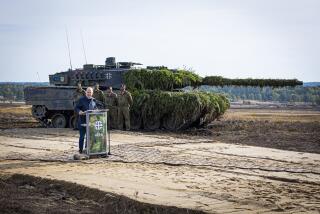No W. German Role in Libya Plant, Bonn Says
- Share via
BONN — West German investigators declared Thursday that after examining U.S.-supplied evidence, they have found no reason to believe that a West German chemical firm secretly served as the general contractor for a plant in Libya that the United States says was built to produce poison gas.
At the same time, the Bonn government said that five West German companies are under investigation on suspicion of helping another Arab government, Iraq, produce its own chemical weapons, which were used against Iran in the Persian Gulf War.
A government report on the Iraqi affair, separate from the Libya-related inquiry, said investigators confiscated documents from the five companies Nov. 25 to determine whether they had violated West German export laws.
No Evidence Found
Regarding Libya, Finance Ministry spokesman Willi Voegele said the ministry’s investigators looked into the activities of the chemical firm Imhausen-Chemie between 1984 and 1988 and found no evidence that the company, based in Lahr in southern Germany, had provided Libya, directly or through intermediaries, with supplies for a chemical weapons plant.
The Finance Ministry announcement was viewed by diplomatic observers here as a sharp rebuke to Washington for having accused the West German company without sufficient evidence. And the finding is expected to exacerbate relations between Bonn and Washington over the issue of alleged West German commercial involvement in the Libyan plant.
In Washington, the State Department did not take the Finance Ministry announcement as the last word on the Imhausen-Chemie probe, Reuters news service reported. “I’m not sure that was the definitive statement of the West German government,” department spokeswoman Phyllis Oakley said, adding that she had seen only the media reports of the West German investigation. “. . . I’m not aware that we have had a definitive answer or response back from the government.”
Satellite Photos
Earlier this week, diplomatic sources said U.S. envoys had shown satellite and air reconnaissance photos to officials in a number of European countries in an attempt to convince them that the Libyan chemical complex, southwest of Tripoli, was intended to produce poison gas.
The U.S. Embassy here would not disclose what sort of evidence Washington presented Bonn that might tie Imhausen-Chemie to the Libyan plant. But West German officials say privately that the data shown to them was far from conclusive that the Libyan plant was built to make chemical warfare components or that any West German firm played a leading role in building the complex.
West German Foreign Minister Hans-Dietrich Genscher, who was equally skeptical about the U.S. evidence, said he will discuss the matter with Secretary of State George P. Shultz at an international conference on chemical warfare, which opens Saturday in Paris.
3rd-Country Middlemen
The New York Times, citing Reagan Administration sources, originally singled out Imhausen-Chemie as the company that had served as general contractor to provide material for construction of the Libyan plant.
According to Administration sources quoted by the paper, the company arranged for construction of the plant through various middlemen in Switzerland, Hong Kong and elsewhere. Other countries, too, had companies involved in the plant’s construction, the sources were quoted as saying.
Juergen Hippenstiel-Imhausen, who is head of Imhausen-Chemie, immediately denied the charges.
After looking into the evidence supplied by Washington, the Finance Ministry said: “The results of the probe have yielded no reason for suspicion of a criminal act through illegal exports.
“Therefore,” ministry spokesman Voegele added, “there is no reason to justify the launching of a corresponding investigation.”
Hippenstiel-Imhausen said Thursday that the findings confirmed “what I have said from the start of this campaign . . . that we have had nothing, absolutely nothing, to do with the ‘Libyan story.’ ”
Bonn officials have been angered by press leaks by U.S. officials accusing West German firms of roles in building poison gas plants.
Volker Ruehe, a senior Christian Democratic adviser to Chancellor Helmut Kohl on arms matters, suggested that West Germany was the target of an American media campaign, declaring that in Washington-Bonn relations, “the ice has become thinner than many think.”
“The West German government,” he added, “has the utmost interest in a swift, thorough and definitive clarification of the American accusations.”
In Bern, Switzerland, Swiss government officials said Thursday that they were trying to contact the owners of two Zurich-based companies--one of them the Swiss subsidiary of Imhausen-Chemie--that Washington has accused of participating in the construction of the Libyan plant.
Foreign Minister Genscher said he will urge that all countries with chemical warfare plants agree to submit to inspections of the sites. His remarks were viewed as a challenge to the United States to open up its chemical weapons sites to compulsory inspection.
As the centrist newspaper Cologne Stady-Anzeiger put it Thursday: “In Genscher’s view, it is unacceptable that Western nations, among them the U.S., hesitate to agree to such inspections for the sake of the private interests of the chemical industry.”
Many private chemical companies in various countries object to any inspections on the grounds that secret patents and processes, having nothing to do with chemical weapons, would be exposed for competitors to see and copy.
More to Read
Sign up for Essential California
The most important California stories and recommendations in your inbox every morning.
You may occasionally receive promotional content from the Los Angeles Times.













